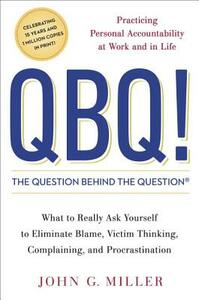Take a photo of a barcode or cover
107 reviews for:
QBQ! the Question Behind the Question: Practicing Personal Accountability at Work and in Life
John G. Miller
107 reviews for:
QBQ! the Question Behind the Question: Practicing Personal Accountability at Work and in Life
John G. Miller
informative
inspiring
lighthearted
fast-paced
Great book on asking better questions to focus on personal accountability in everyday situations. Very easy read that I should come back to frequently.
The anecdotes read like low level employees should go without food to take care of a customer instead of the corporation fixing policies and procedures. Like many other business books, this one reduces complexity and nuance to catch phrases.
The thinking could be useful if the anecdotes focused on not blaming others for your bad behaviors or thoughts. However, an anecdote where a check out clerk would pay for a customers order because the corporate procedure was so bad that it would infuriate a line of customers is the wrong answer to the question. Then to gleefully say that said employee couldn't accept a tip, per corporate policy, and instead chose to donate it to a group pizza party account (I'm assuming that is funded by the employees as well) is sending a terrible message.
This mantra is best used by upper level management to not blame poor customer service on the rank and file employees. People generally do not want to hate their jobs and perform poorly. The underlying questions revolve around inflexible policies put in place by people removed from the very scenarios for which those policies are created. If making change is so painful to both employee and customer that a minimum wage employee is willing to pay for the item, the problem is not that other clerks won't do the same, it is that the policy is terrible and needs to be changed. It's not that hard.
The thinking could be useful if the anecdotes focused on not blaming others for your bad behaviors or thoughts. However, an anecdote where a check out clerk would pay for a customers order because the corporate procedure was so bad that it would infuriate a line of customers is the wrong answer to the question. Then to gleefully say that said employee couldn't accept a tip, per corporate policy, and instead chose to donate it to a group pizza party account (I'm assuming that is funded by the employees as well) is sending a terrible message.
This mantra is best used by upper level management to not blame poor customer service on the rank and file employees. People generally do not want to hate their jobs and perform poorly. The underlying questions revolve around inflexible policies put in place by people removed from the very scenarios for which those policies are created. If making change is so painful to both employee and customer that a minimum wage employee is willing to pay for the item, the problem is not that other clerks won't do the same, it is that the policy is terrible and needs to be changed. It's not that hard.
A practical book with real life (hopefully) examples. Gets you look inward to change the world around you. In this rampant narcissistic and self-absorbed age, this book is an be a game changer on how you approach issues. Must read if you work in teams and want to be a better manager/team player. However, be careful applying this concept in personal life relationships as sociopaths will easily manipulate you. Kudos to the author for making this book extremely brief to capture an average social media addicted attention deficit mind.
My company used to have a book club in which the entire staff participated. Prior to my becoming a full time employee with the company and being included in this activity, they read "QBQ!" The book continues to be referenced by executive management and our Account Service Department is reading the book together. Well, I couldn't be left out, so I had to buy it and read it for myself.
I learned a few of the principles in this book though my own failings earlier in life (okay, within the last 12 years) and truly believe in the power of personal accountability. I take away an even greater depth to some of the basics I've already embraced and something I can share as I coach my team at work. No, I can't change them, but I can share this book.
Favorites for me: you always have a choice (I've been saying this for years.) Stress is a choice. Think in "I" terms not them. Do not adopt victim mentality.
It's energizing to read a book and flip your thinking.
I learned a few of the principles in this book though my own failings earlier in life (okay, within the last 12 years) and truly believe in the power of personal accountability. I take away an even greater depth to some of the basics I've already embraced and something I can share as I coach my team at work. No, I can't change them, but I can share this book.
Favorites for me: you always have a choice (I've been saying this for years.) Stress is a choice. Think in "I" terms not them. Do not adopt victim mentality.
It's energizing to read a book and flip your thinking.
This is a repetitive little book that makes a few valid points. My company had me read it, and I can see some of the logic. However, I think that there are certain situations that can not be overcome by QBQ attitude. Improper employee training being one such thing...
Pretty interesting look at how we should behave in business and life overall
Wow. Simple message, fast read. Rather than having IQs (incorrect questions), John G. Miller encourages you to: - Ask how/what questions rather than why, when, etc. - Ask questions that contain "I" pronouns - Focus on action - when framing the questions behind the questions.
This was required reading at my workplace. I can get behind the idea: personal accountability but the book didn't introduce anything new to me. It is an easy way to get people up to speed who maybe haven't untangled personal accountability on their own yet. Some of the author's examples drive me up the wall. For example, if I left work to get a customer a soda, or worse yet, told my manger to, I would've been fired from most jobs so while that may have really please the customer, it's actually crazy talk.
Good idea. Bad examples. Not great writing.
Good idea. Bad examples. Not great writing.
John G. Miller has written this wonderful guide to teach us how to begin to eliminate blame and complaining. Instead of blaming others, ask "What can I do to make this better?"



